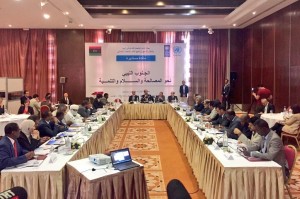Some 30 leading personalities from southern Libyan have been taking part in a three-day round-table gathering in Tunis to discuss ways to solve the Libyan crisis.
Organised by the United Nations Support Mission in Libya (UNSMIL) and UN Development Programme (UNDP), the gathering, entitled “Southern Libya towards Reconciliation, Peace and Development” follows the publication of a seven-point initiative last week by southern members of the House of Representative also aimed at solving the crisis.
In his opening address on Monday, UN Special envoy Martin Kobler, stressed the importance of the south, which has been largely ignored in the growing splits in Libya, which are almost entirely between east and west.
“The south is very important geopolitically, and must play a key role in building Libya. A united Libya needs an important contribution from the south, because it was neglected in the past. The United Nations always stands behind those who feel marginalized,” Kobler said.
Two of the southern members of the Presidency Council, Musa Koni and Abdulsalam Kajman, also attended the session. The workshop ends today.
Meanwhile, the initiative from southern HoR members to unblock the current political logjam between the Presidency Council in the west and the HoR in the east centres security issues. It proposes Mahdi Barghathi be removed as defence minister and Khalifa Hafter being appointed general commander of the armed forces although the Presidency Council would be the supreme commander of the Libyan armed forces, responsible for declaring war and peace and all major security decisions.
In its role as supreme commander, the PC would have to act unanimously.
The controversial supplementary Article 8 in the Libyan Political Agreement under which the Presidency Council is supposed to appoint or reappoint heads of major military, security and civilian posts within 20 days of the LPA being signed. Many see the article as an anti-Hafter move.
The other main points in the initiative are that there would be seven extra ministries in the government – three from the western region and two each from the south and east – and that boycotting Presidency Council members Ali Gatrani and Omar Al-Aswad would rejoin and would be able to nominate two ministers in the cabinet. This is on the basis that they were absent when the existing ministers were chosen.
In Gatrani’s case the proposal is that he should nominate the finance minister.
Fakhr Muftah Bufernah is currently the GNA’s man in post.
The chances of all the proposals been accepted by the Presidency Council is slim. At the very least it is unlikely to accept changes to existing GNA ministers.
The matter Khalifa Hafter is far more complicated. Generally popular in much of the east although he still has not fully liberated Benghazi, he is so widely rejected throughout most of the west that his appointment as general commander would seem impossible in the present situation.
By Libya Herald reporters.
https://www.libyaherald.com/2016/06/01/focus-on-bringing-peace-to-libya-...


